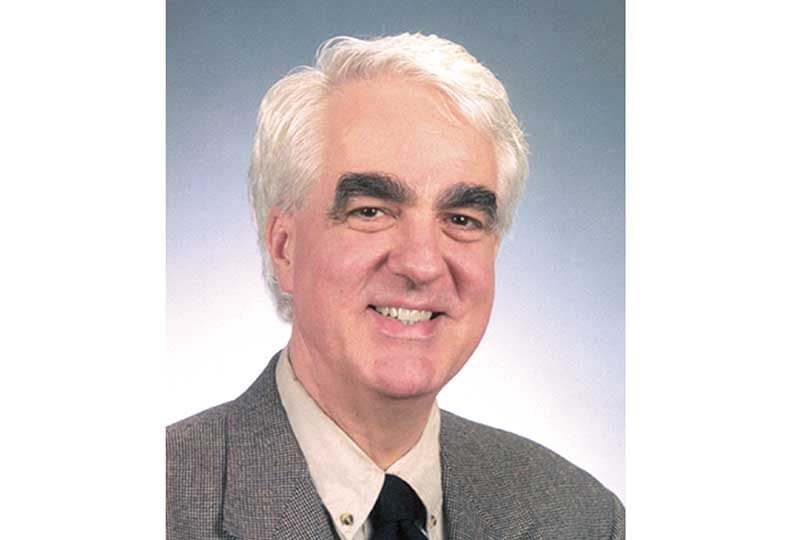
Home » Remembering historic preservation champion Ron Wells
Remembering historic preservation champion Ron Wells
Ridpath rescuer saved buildings with character before falling from grace

Ron Wells, shown here in a Wells & Co. image from 2002, died Feb. 11.
February 29, 2024
Spokane’s urban skyline likely would be missing some of its historic character were it not for Ron Wells, people who worked with the innovative preservationist say.
Wells, 75, the prominent Spokane developer and architect behind iconic downtown historic preservation projects such as Steam Plant Square and the Ridpath Hotel who fell from grace five years ago after participating in an insurance fraud scheme, died Sunday, Feb. 11.
Ron Wendle, who was a longtime architect with Wells & Co., says he knew Wells for about 50 years as his employer, colleague, and friend.
Wendle says Wells envisioned new ways of bringing life to dormant and decaying structures. “He saw things that others didn’t.”
He says Wells, who had been a faculty member at the University of Idaho, was coming off a successful renovation of an apartment and retail building in Moscow, when he turned to Lilac City in the early 1980s.
“He was running out of opportunities there, and Spokane looked like a target-rich environment,” Wendle says.
He says Wells attracted and reciprocated loyalty. “It was a two-way street,” Wendle says. “He had long-term relationships with business partners and people who worked for him for years.”
Wendle says Wells & Co. completed over 20 certified historic renovations and dozens more preservation projects in Spokane alone.
Some of the earliest projects include the Eldridge building, at 1325 W. Cedar, and others clustered in the area of First Avenue and Cedar Street, which Wells dubbed Carnegie Square due to their proximity to the Carnegie Library building, at 10 S. Cedar.
“Ron would find an older building, put together financing, purchase and renovate it, and continue to own it,” he says. “He didn’t look at an individual building. He looked at the neighborhood around it.”
While the restoration of the four-building Ridpath Hotel complex centered at 515 W. Sprague was Wells’ main project in the last decade of his career, Wendle says one of Wells' favorite historic preservation projects was the Steam Plant Square complex, at 823 W. Railroad Alley.
Kim Pearman-Gillman, who was senior vice president of the building's owner, Avista Development, worked with Ron and Julie Wells, his wife and business partner at the time, on the project for 3 1/2 years redeveloping the Steam Plant and adjacent Seehorn-Lang Building, at 151 S. Lincoln.
“I remember fondly the meetings where we would get together and think about what the Steam Plant could be,” Pearman-Gillman says. “The whole methodology was to let it unveil itself based on what it could and couldn’t become. We were going to save everything we could and make it part of the experience.”
In 2001, Steam Plant Square was recognized with the top preservation award from the National Trust for Historic Preservation, Pearman-Gillman says. “It won a lot of awards,” she adds.
Avista also hired Wells & Co. as a development partner to convert the former Rodeway Inn City Center, at 827 W. First, into the Courtyard Office Center.
“Ron (Wendle) probably gave himself no credit, but he was an amazing architect,” she says. “He put pencil to paper on a lot of their visions.”
Paul Mann, managing partner of the Ridpath Owners LLC, says he was introduced to Wells by a neighbor because of their shared interest in historic preservation.
“We were friends for 30 years plus,” Mann says.
Mann says he got involved with the $22 million Ridpath project when he, Wells, and another partner bought the two top floors in 2012.
“I’m convinced had he not come along, this whole building would still be vacant,” Mann says. “We’ve got over 200 people here now. It’s one of the largest providers of affordable housing in the downtown core.”
Mann says he had power of attorney regarding the Ridpath project when Wells fell ill in 2018, and Mann retained that responsibility after Wells was indicted in the insurance fraud case.
“I tried to build on the original vision,” he says. “Ron really had an eye for the potential of historic buildings. He had enormous impact on this city as a result. I hope he’s remembered for good things he did, which were many and lasting.”
Kevin Curtis, of Spokane law firm Winston & Cashatt Lawyers, who represented Wells in his criminal case, says Wells was incredibly remorseful.
“In his passion to finish the Ridpath project, he took a loan from an unsavory individual, and from there, things got worse,” Curtis says.
Wells pleaded in federal court to nine felony counts for his role in insurance fraud involving staged accidents. He was sentenced in 2020 to a year of home confinement, three years of probation, and nearly $240,000 in fines and restitution.
“It was such an aberration from his general character,” Curtis says. “He wanted to be remembered for good things rather than one lapse in judgment.”
Latest News Features Real Estate & Construction Retrospective
Related Articles





